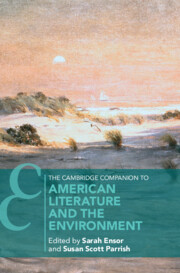Book contents
- The Cambridge Companion to American Literature and the Environment
- The Cambridge Companion to American Literature and the Environment
- Copyright page
- Dedication
- Contents
- Figures
- Contributors
- Acknowledgments
- A Note on the Cover Image
- Introduction
- Part I Environmental Histories
- Part II Environmental Genres and Media
- Part III Environmental Spaces, Environmental Methods
- Chapter 11 Urban Narrative and the Futures of Biodiversity
- Chapter 12 Japanese American Incarceration and the Turn to Earth: Looking for a Man Named Komako in Bad Day at Black Rock
- Chapter 13 Leisure over Labor: Latino Outdoors and the Production of a Latinx Outdoor Recreation Identity
- Chapter 14 Sanctuary: Literature and the Colonial Politics of Protection
- Chapter 15 The Queer Restoration Poetics of Audre Lorde
- Notes
- Index
- Cambridge Companions to …
Chapter 14 - Sanctuary: Literature and the Colonial Politics of Protection
from Part III - Environmental Spaces, Environmental Methods
Published online by Cambridge University Press: 10 March 2022
- The Cambridge Companion to American Literature and the Environment
- The Cambridge Companion to American Literature and the Environment
- Copyright page
- Dedication
- Contents
- Figures
- Contributors
- Acknowledgments
- A Note on the Cover Image
- Introduction
- Part I Environmental Histories
- Part II Environmental Genres and Media
- Part III Environmental Spaces, Environmental Methods
- Chapter 11 Urban Narrative and the Futures of Biodiversity
- Chapter 12 Japanese American Incarceration and the Turn to Earth: Looking for a Man Named Komako in Bad Day at Black Rock
- Chapter 13 Leisure over Labor: Latino Outdoors and the Production of a Latinx Outdoor Recreation Identity
- Chapter 14 Sanctuary: Literature and the Colonial Politics of Protection
- Chapter 15 The Queer Restoration Poetics of Audre Lorde
- Notes
- Index
- Cambridge Companions to …
Summary
This chapter argues that human and environmental sanctuary, operating within liberalism, is a constituent aspect of US colonialism, not an exception from it. The chapter offers a cultural genealogy of sanctuary as a justificatory logic of US settler expansion through a reading of Terry Tempest Williams’ memoir, Refuge: An Unnatural History of Family and Place (1991). Against this, the chapter turns away from the canon of white American nature writing in order to center literary and material practices of survival that do not depend on international, colonial orders of protection. Here, the chapter reads Joan Naviyuk Kane’s collections of poems, The Straits (2105) and Milk Black Carbon (2017), written in the aftermath of the King Island Diaspora, as poetic and social experiments in thinking beyond colonial state sanctioned modalities of safety, return, and kinship.
- Type
- Chapter
- Information
- Publisher: Cambridge University PressPrint publication year: 2022
- 8
- Cited by

